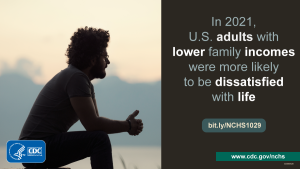Almost 5% of Adults Dissatisfied with Life in 2021
Posted on by According to a new National Health Statistics Report from the National Center for Health Statistics, 4.8% of adults were dissatisfied with life in 2021.
According to a new National Health Statistics Report from the National Center for Health Statistics, 4.8% of adults were dissatisfied with life in 2021.
The report, “Demographic Differences in Life Dissatisfaction Among Adults: United States, 2021” describes differences in life dissatisfaction by selected characteristics, grouped by family income. It uses data from the 2021 National Health Interview Survey to examine the percentage of adults that were dissatisfied with life by age, sex, race and Hispanic origin, and whether they were U.S.-born.
Adults with family incomes of less than 200% of the federal poverty level were more likely to be dissatisfied or very dissatisfied with life compared with adults with family incomes greater than 200% or more of the federal poverty level.
Among adults with family incomes of less than 200% of the federal poverty level, some groups were more likely to be dissatisfied with life compared with their counterparts:
- Men (9.3%) were more likely to be dissatisfied than women (7.2%).
- Adults ages 45‒64 (11.1%) were more likely to be dissatisfied than those ages 18‒44 (6.8%), and 65 and older (7.2%).
- White non-Hispanic adults (9.7%) and Black non-Hispanic adults (9.0%) were more likely to be dissatisfied than Hispanic adults (5.0%) or Asian, non-Hispanic adults (4.7%).
- Adults born in the United States (9.2%) were more likely to be dissatisfied than those born outside the U.S. (4.7%).
There were no significant differences in life dissatisfaction by selected demographic characteristics among adults with incomes greater than 200% of the federal poverty level.
2021 was the first year questions about life satisfaction were included in the National Health Interview Survey. Life satisfaction is an important indicator of overall health and well-being. Continuing to track trends in life satisfaction from the 2021 baseline will help document progress toward the Healthy People 2030 goals of improving overall well-being and reducing disparities in well-being.
The National Health Interview Survey is a nationally representative household survey of the civilian noninstitutionalized U.S. population. It is conducted continuously throughout the year by the National Center for Health Statistics.
Posted on by

